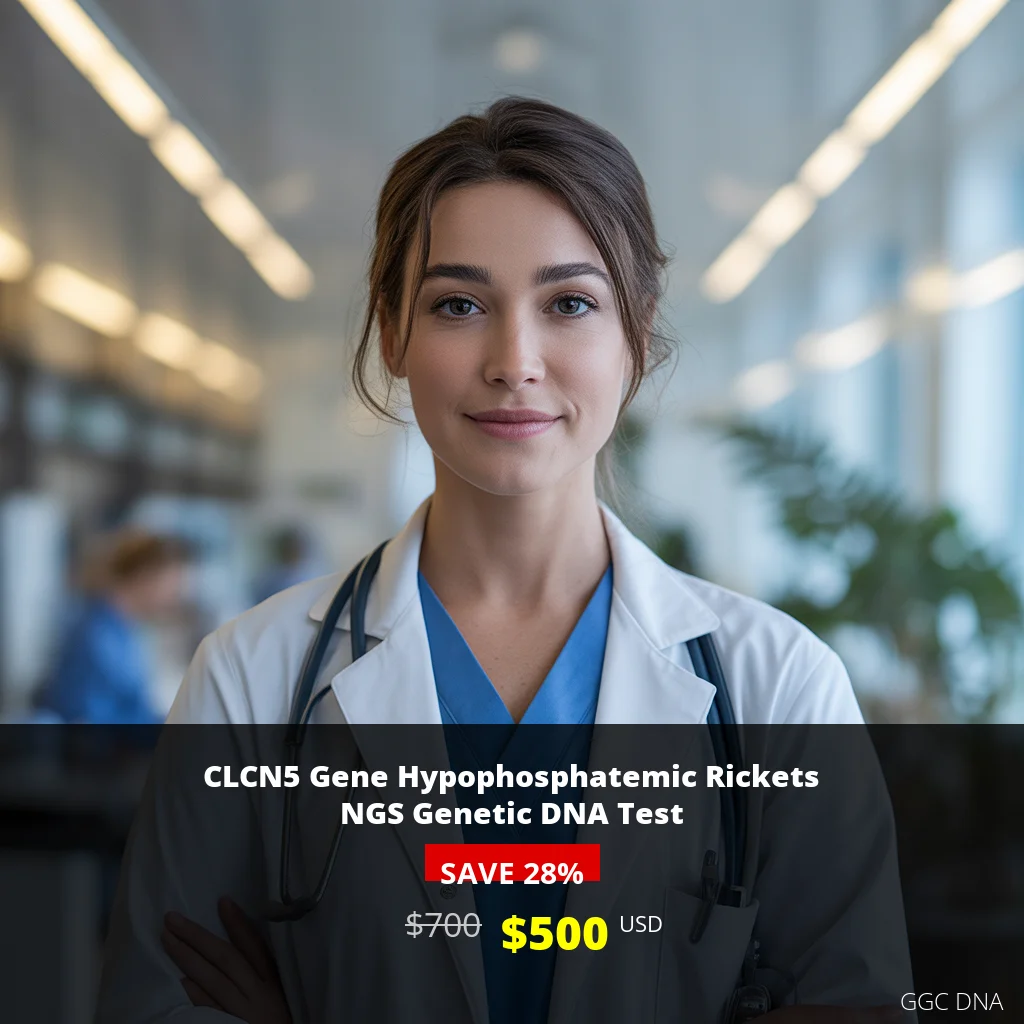CLCN5 Gene Hypophosphatemic Rickets NGS Genetic DNA Test
Comprehensive Genetic Testing for Renal Phosphate Wasting Disorders
The CLCN5 Gene Hypophosphatemic Rickets NGS Genetic DNA Test represents a breakthrough in molecular diagnostics for inherited renal disorders. This advanced genetic test utilizes next-generation sequencing technology to identify mutations in the CLCN5 gene, which encodes a crucial chloride channel protein essential for proper kidney function and phosphate regulation.
What Does This Test Measure?
This sophisticated genetic analysis specifically targets the CLCN5 gene located on the X chromosome. The test detects:
- Point mutations affecting chloride channel function
- Small insertions and deletions disrupting protein structure
- Copy number variations affecting gene dosage
- Splice site mutations altering protein production
- Frameshift mutations causing premature protein termination
Clinical Importance and Scientific Basis
The CLCN5 gene encodes the CLC-5 chloride channel protein, which plays a vital role in endosomal acidification within renal proximal tubule cells. Mutations in this gene disrupt the normal reabsorption of phosphate, calcium, and other essential minerals, leading to the characteristic features of X-linked hypophosphatemic rickets (Dent disease). Understanding the specific genetic defect enables precise diagnosis and targeted therapeutic interventions.
Who Should Consider This Genetic Test?
Clinical Indications and Symptoms
This test is recommended for individuals presenting with:
- Unexplained hypophosphatemia with normal vitamin D levels
- Progressive bone pain and skeletal deformities
- Growth retardation in childhood
- Renal phosphate wasting without apparent cause
- Hypercalciuria and kidney stone formation
- Low-molecular-weight proteinuria
- Progressive renal insufficiency
- Family history of similar bone or kidney disorders
Specialty Considerations
This test is particularly valuable for patients under the care of:
- Nephrologists managing renal phosphate wasting
- Endocrinologists treating metabolic bone diseases
- Geneticists evaluating inherited disorders
- Pediatricians managing growth abnormalities
- Rheumatologists addressing unexplained bone pain
Benefits of CLCN5 Genetic Testing
Diagnostic Advantages
- Definitive Diagnosis: Provides conclusive genetic confirmation of Dent disease
- Early Intervention: Enables proactive management before irreversible kidney damage
- Family Planning: Identifies carrier status and inheritance patterns
- Treatment Guidance: Informs targeted phosphate and vitamin D supplementation
- Prognostic Information: Helps predict disease progression and complications
Clinical Management Benefits
- Eliminates unnecessary diagnostic procedures
- Reduces diagnostic uncertainty and medical costs
- Facilitates personalized treatment approaches
- Enables monitoring of at-risk family members
- Supports genetic counseling and reproductive decisions
Understanding Your Test Results
Interpretation Guidelines
Your genetic test results will fall into one of these categories:
Positive Result
A positive result indicates the presence of a pathogenic mutation in the CLCN5 gene, confirming the diagnosis of X-linked hypophosphatemic rickets (Dent disease). This finding:
- Confirms the genetic basis of symptoms
- Guides specific treatment with phosphate supplements
- Indicates the need for regular kidney function monitoring
- Suggests genetic testing for at-risk family members
Negative Result
A negative result suggests that no disease-causing mutations were detected in the CLCN5 gene. This may indicate:
- Alternative genetic causes for symptoms
- Non-genetic factors contributing to phosphate wasting
- Need for additional genetic testing for related disorders
- Consideration of other renal phosphate wasting syndromes
Variant of Uncertain Significance
Some genetic changes may be classified as variants of uncertain significance (VUS). These require:
- Additional family studies for clarification
- Periodic re-evaluation as scientific knowledge advances
- Clinical correlation with symptoms and laboratory findings
Test Details and Pricing
| Test Parameter | Details |
|---|---|
| Test Name | CLCN5 Gene Hypophosphatemic Rickets NGS Genetic DNA Test |
| Discount Price | $500 USD |
| Regular Price | $700 USD |
| Turnaround Time | 3 to 4 Weeks |
| Sample Type | Blood, Extracted DNA, or One Drop Blood on FTA Card |
| Testing Method | Next-Generation Sequencing (NGS) Technology |
| Specialties | Nephrology, Endocrinology, Genetics, Hepatology |
Pre-Test Requirements
Essential Preparations
- Clinical History: Comprehensive medical history of the patient
- Genetic Counseling: Pre-test genetic counseling session required
- Family Pedigree: Detailed family history chart documenting affected relatives
- Informed Consent: Understanding of test implications and limitations
Nationwide Testing Availability
We proudly offer comprehensive genetic testing services across the United States with convenient locations in all major metropolitan areas. Our state-of-the-art facilities in New York, Los Angeles, Chicago, Houston, Phoenix, Philadelphia, San Antonio, San Diego, Dallas, and San Jose ensure accessible genetic testing for patients nationwide.
Why Choose Our Genetic Testing Services?
- CLIA-certified laboratory ensuring highest quality standards
- Board-certified genetic counselors and medical geneticists
- Advanced NGS technology for comprehensive mutation detection
- Rapid turnaround with detailed clinical reports
- Insurance coordination and financial assistance programs
Take Control of Your Health Today
Don’t let unexplained bone pain, growth issues, or kidney problems remain a mystery. The CLCN5 Gene Hypophosphatemic Rickets NGS Genetic DNA Test provides the answers you need for proper diagnosis and targeted treatment. Our genetic specialists are ready to guide you through the testing process and help interpret your results.
Call or WhatsApp us today at +1(267) 388-9828 to schedule your genetic counseling session and book your test. Take the first step toward understanding your genetic health and developing an effective management plan for renal phosphate wasting disorders.
Early genetic diagnosis can prevent progressive kidney damage and improve long-term outcomes. Contact us now to learn more about this essential genetic test and how it can benefit you and your family.







